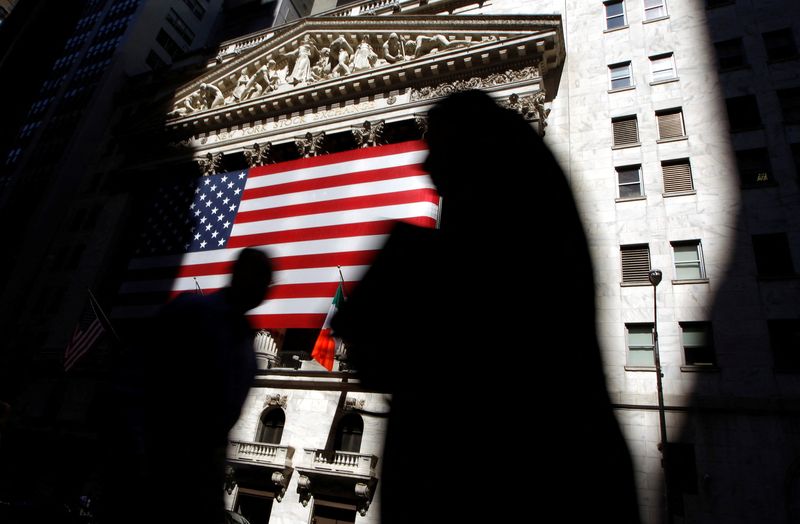Investing.com -- U.S. stock futures are in the green prior to the beginning of the last full trading week before the Christmas holiday, with investors eyeing the outlook for potential Federal Reserve interest rate cuts next year. Elsewhere, gene-sequencing group Illumina (NASDAQ:ILMN) announces plans to divest blood cancer-test seller Grail following intense antitrust scrutiny and shares in China's SenseTime slip after it announces the death of its founder.
1. Futures edge higher
U.S. stock futures inched higher on Monday, pointing to a possible extension in a Christmastime rally that has been fueled by hopes for a Federal Reserve policy pivot next year.
By 05:01 ET (10:01 GMT), the Dow futures contract had gained 73 points or 0.2%, S&P 500 futures had risen by 12 points or 0.2%, and Nasdaq 100 futures had inched up by 23 points or 0.1%.
The main indices on Wall Street were mixed to end the previous week after New York Fed President John Williams noted that policymakers were not "really talking about" interest rate cuts "right now." The comments served to temper hopes that the central bank would start to lower rates from more than two-decade highs as early as the spring.
Last week, the Fed voted to keep borrowing costs steady at 5.25% to 5.50%. However, fresh quarterly projections showed that members, buoyed by signs of cooling inflation and resilient economic growth, were pricing in 75 basis points in cuts in 2024. The announcement helped lift the benchmark S&P 500, 30-stock Dow Jones Industrial Average, and tech-heavy Nasdaq Composite to their seventh consecutive week of gains. U.S. Treasury yields, which move inversely to prices, also slipped.
2. Gold shines
The Fed's dovish outlook has also driven a jump in gold prices, putting the yellow metal on pace for its first annual increase since 2020.
According to Investing.com's Fed Rate Monitor Tool, investors now see a roughly 65% chance that the bank will unveil a quarter-point rate reduction as soon as March next year, up from just under 42% in the prior week. The probability that the Fed will roll out a further cut in May stands at around 58%, well above last week's mark of about 24%.
These expectations have dented the appeal of holding zero-yield bullion. A slide in the U.S. dollar has also burnished gold, making it less expensive for overseas buyers. The dollar index, which tracks the greenback against a basket of other currencies, shed 1.3% last week.
At 05:01 ET on Monday, spot gold prices had risen by 0.2% to $2,023.13 per troy ounce.
3. Illumina to divest Grail
Illumina has said it will divest cancer-screening start-up Grail, as the gene-sequencing device maker looks to appease antitrust regulators in both the U.S. and Europe.
In a statement on Sunday, San Diego-based Illumina noted that divestiture will be executed through a "third-party sale or capital markets transaction."
Illumina acquired Grail in 2021 in an agreement that valued the seller of a blood test designed for the early detection of cancer at $7.1 billion. However, the agreement has faced heavy scrutiny, particularly after it was completed without the formal approval of the European Commission. The divesiture of Grail would be "consistent" with an order from Brussels, Illumina noted.
The troubled deal has also faced pushback from the U.S. Federal Trade Commission, which flagged that Illumina could deny crucial inputs into cancer-detecting blood tests offered by Grail's rivals.
On Friday, a federal appeals court found that while the FTC was right to issue the challenge, it must conduct a new review of the purchase. Illumina said it would not appeal the ruling.
Shares in Illumina edged higher in premarket trading in New York on Monday.
4. SenseTime shares slip after AI firm announces death of co-founder
Shares in SenseTime Group (HK:80020) slumped on Monday, touching an all-time low, after the Chinese artificial intelligence business announced that founder Tang Xiao'ou had died.
SenseTime (HK:0020) said over the weekend that Tang had died of an unspecified illness on Friday. He was 55 years old, CNBC reported.
Tang, a professor at the Chinese University of Hong Kong, set up SenseTime in 2014. Its AI-based content generation and facial recognition technology have since received strong demand from both the public and private sectors.
But the firm has also been blacklisted by U.S. authorities since 2019. Washington has alleged that SenseTime aided Beijing in running state surveillance of Uyghur minorities in China's Xinjiang region.
5. Oil choppy
Oil prices were volatile on Monday, as traders weighed Russian export reductions and jitters over attacks on commercial vessels in the Red Sea with weak business morale data out of top European economy Germany and a fresh forecast from Goldman Sachs.
By 06:23 ET, the U.S. crude futures traded 0.5% higher at $72.17 a barrel, while the Brent contract climbed by 0.6% to $76.99 per barrel. Both benchmarks posted limited gains last week, stemming seven straight weeks of declines, thanks in large part to hopes for Fed rate cuts next year.
Crude prices received support from Russia, which said on Sunday that it would deepen oil export cuts in December by around 50,000 barrels per day. Additionally, concerns are growing over the potential for disruption to global supplies as a number of shipping firms said they would avoid the Suez Canal given the increase in assaults on commercial vessels in the Red Sea by Houthi militants in Yemen.
However, according to figures from the Ifo Institute, the mood amongst German companies unexpectedly worsened in December, with energy-intensive industries "having a particularly tough time." The survey said that firms were "more skeptical about the first half of 2024."
Also impacting sentiment was a decision by Goldman Sachs to trim its price expectations for Brent crude in 2024 by $10 per barrel to between $70 to $90. The bank said strong U.S. output could mitigate possible upward pressure on oil prices.
